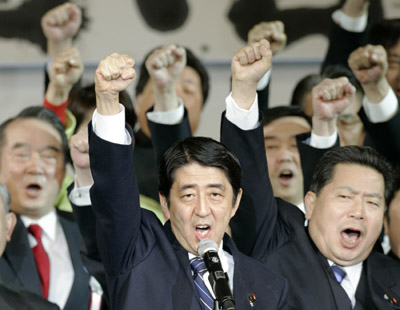Japan lawmakers to visit shrine
(AP)Updated: 2007-01-17 15:33
TOKYO - Japan's ruling party declared on Wednesday that its members would continue to visit a Tokyo war shrine, defying critics who say the visits glorify militarism and risking a deterioration in relations with China and South Korea.
 Japanese Prime Minister Shinzo Abe raises his fist with other members of the ruling Liberal Democratic Party during the annual party convention in Tokyo January 17, 2007. [Reuters]  |
Prime Minister Shinzo Abe, who succeeded the popular Junichiro Koizumi promising to pursue a more assertive foreign policy, has not visited the shrine since he took office in September, though previously he made regular pilgrimages. Nor has he clarified whether he intends to uphold the tradition while in office.
But his Liberal Democratic Party declared at its annual convention Wednesday that it will stick to past policy.
"We will carry on visiting the Yasukuni Shrine, to mourn those who sacrificed their lives as the foundation of the country, to make an anti-war pledge and renew our commitment to peace," the party announced on its Web site.
The party also approved its policy agenda for 2007, which calls for revising the US-drafted 1947 constitution, for changes in education to instill patriotism and for a stronger alliance with the US to speed up missile defense amid North Korea's nuclear threats.
Koizumi's repeated visits to Yasukuni Shrine ruptured Tokyo's diplomatic ties with China and South Korea, which heavily suffered under Japan's colonial aggression during the first half of the 1900s.
The shrine honors Japanese war dead, including executed wartime leaders, and many in Asia and at home see it as proof that Japan has not fully atoned for its militaristic past.
Relations with South Korea and China improved after Abe paid the countries a visit immediately after he became prime minister.
The shrine, founded in 1869, played a role in promoting wartime nationalism, with Japanese soldiers commonly pledging to fight to the death with the promise to "meet at Yasukuni."
Abe wants a more confident Japan that can distance itself from post-World War II guilt by amending the constitution and giving the military a bigger international profile.
His party has long campaigned to replace the pacifist constitution drafted by US forces after World War II to revise phrasing that renounces the country's right to offensive action and bans maintaining a military for warfare.
|
||
|
||
|
|